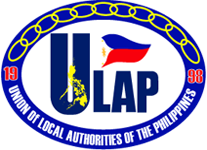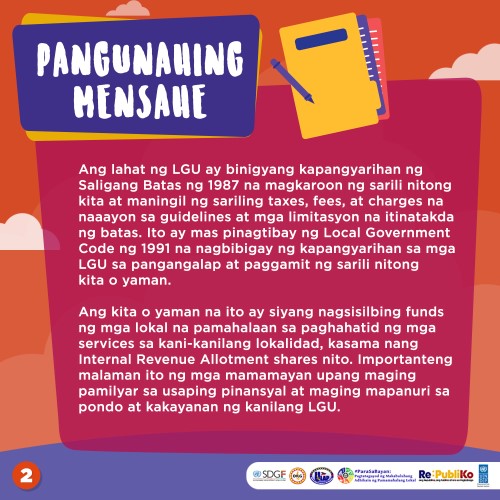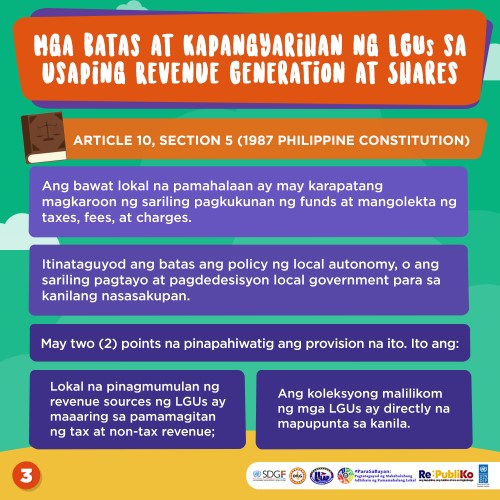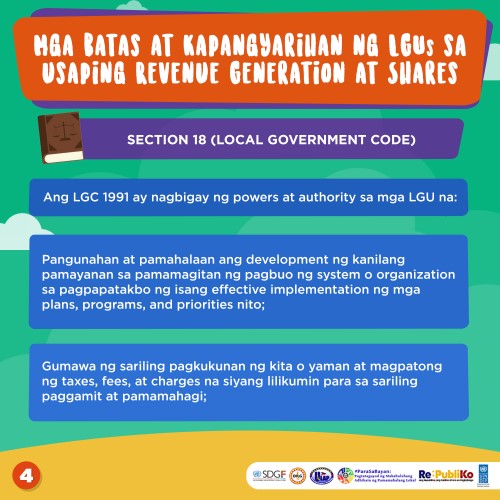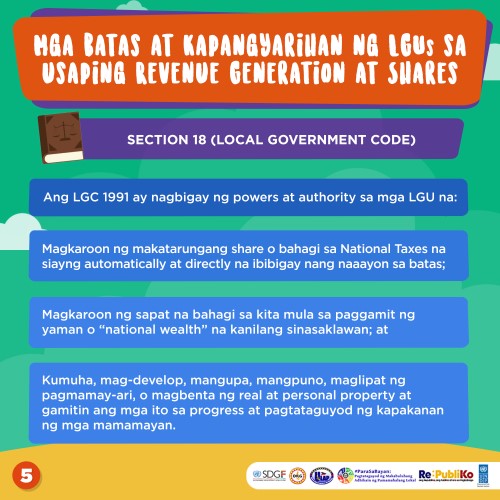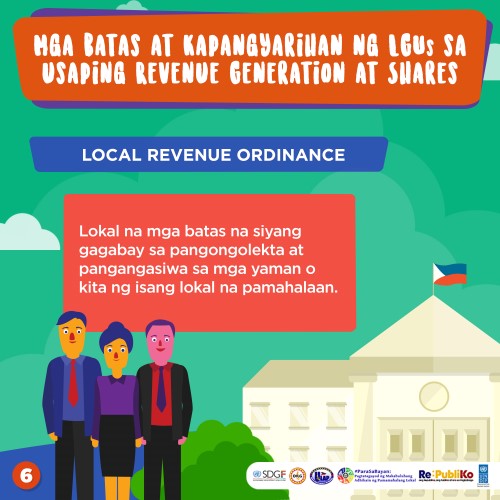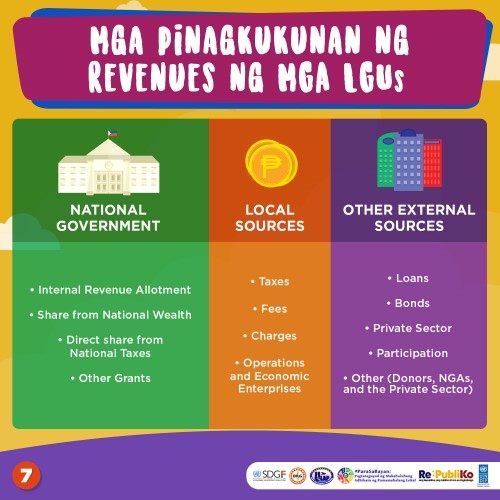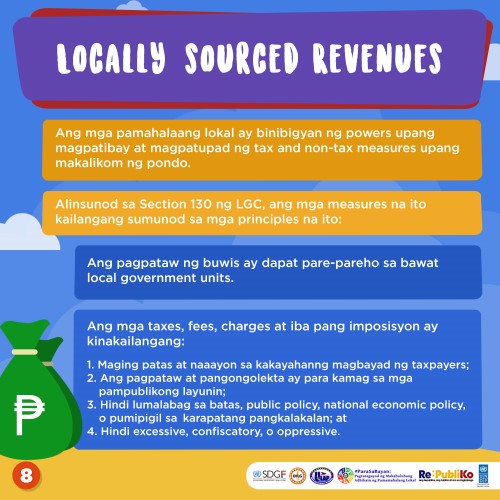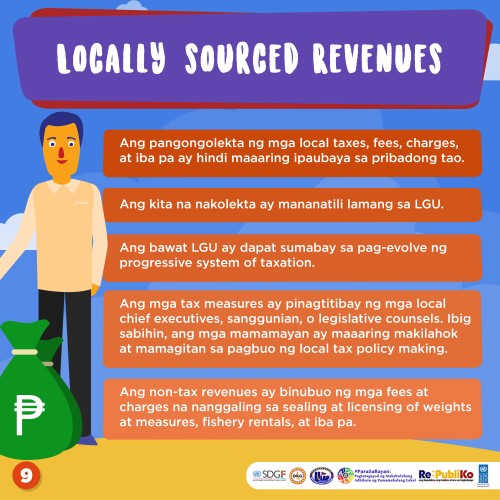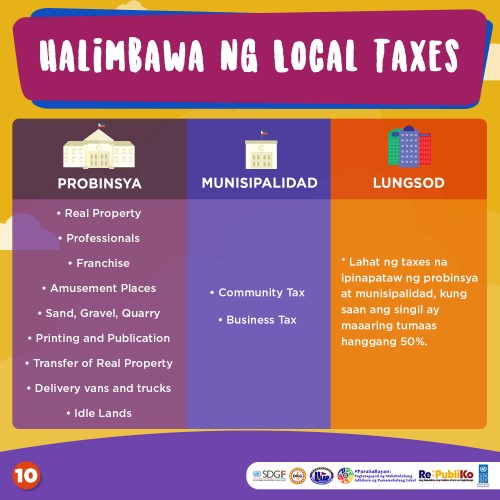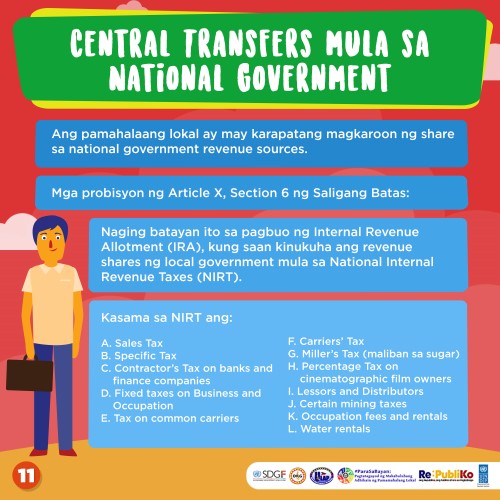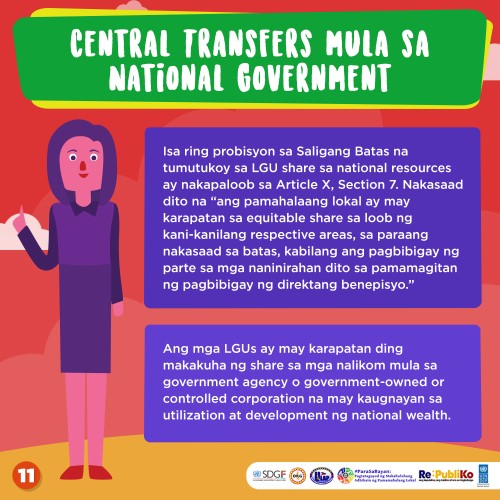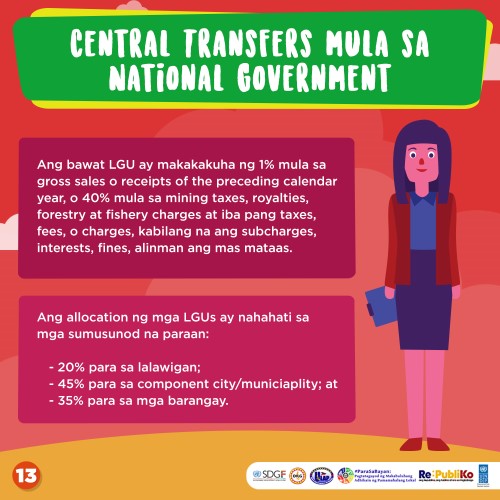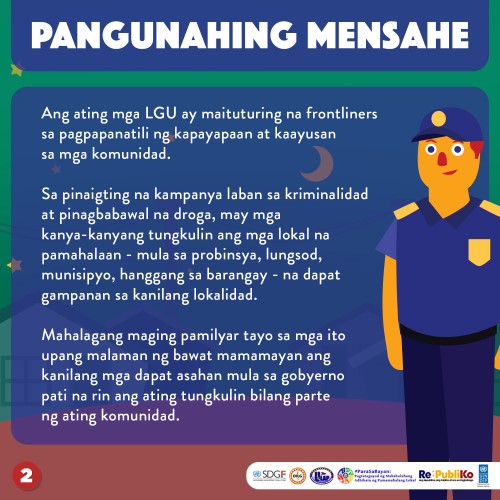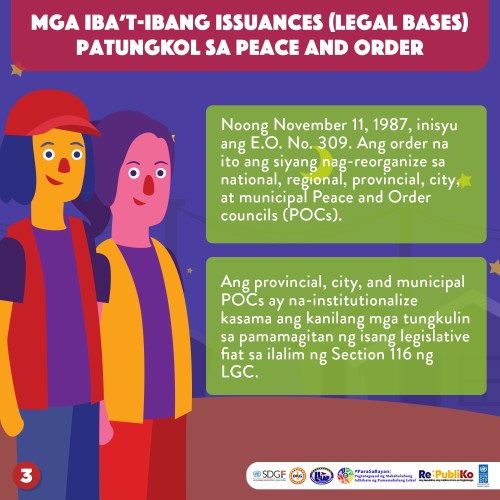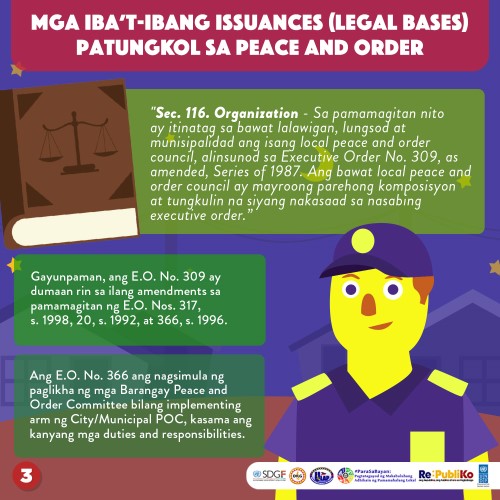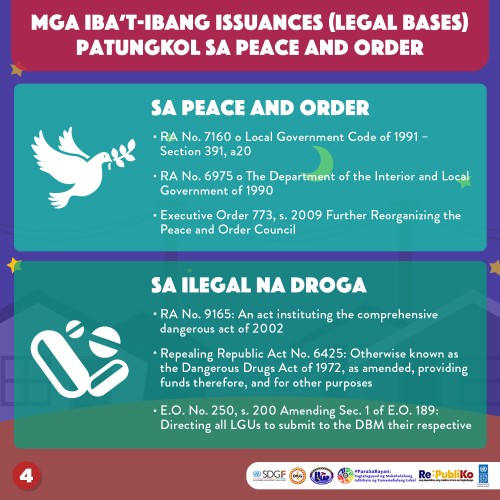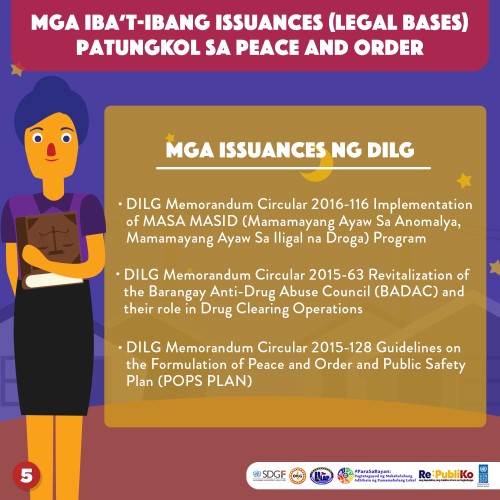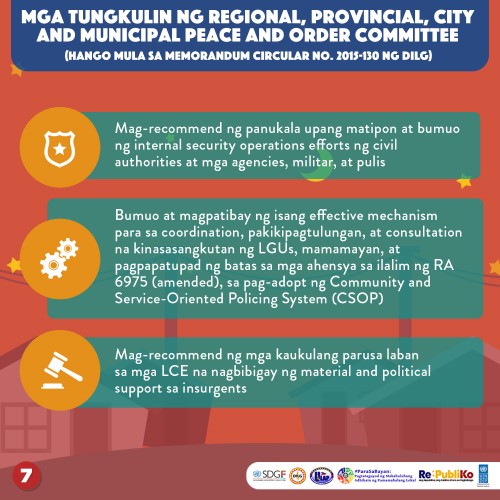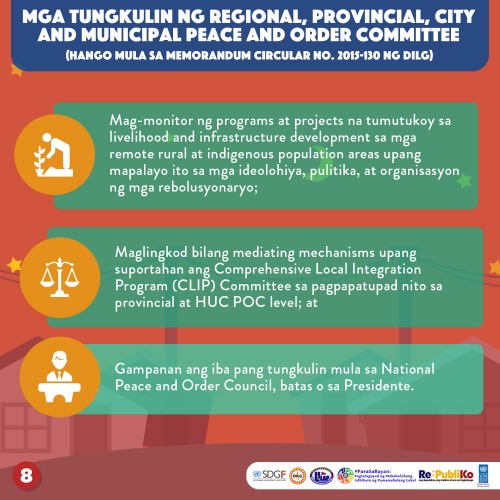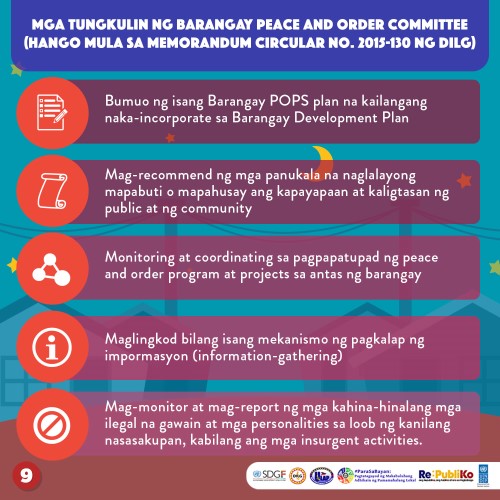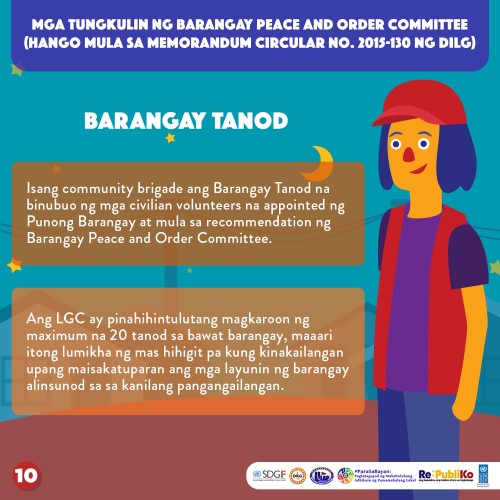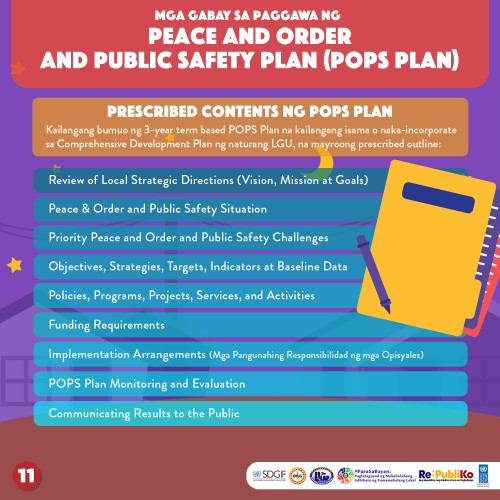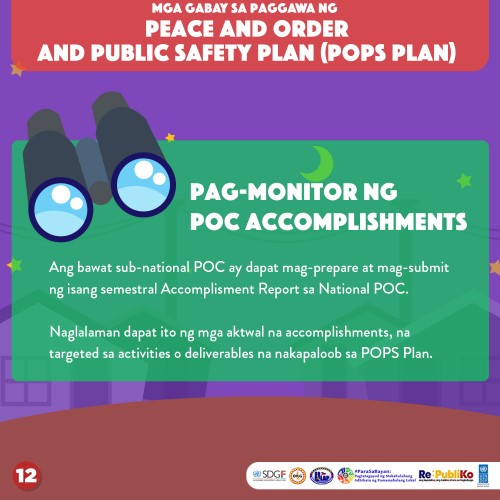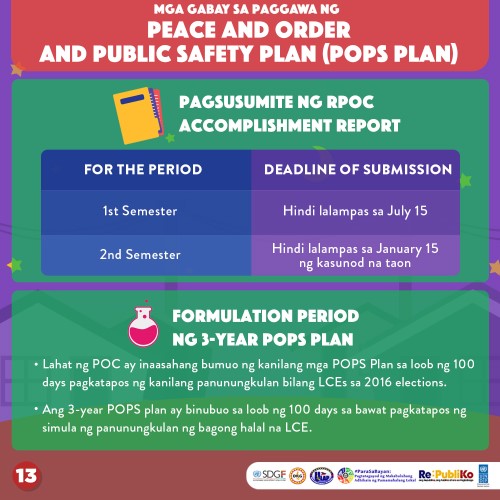REVENUE SOURCES NG MGA LOKAL NA PAMAHALAAN
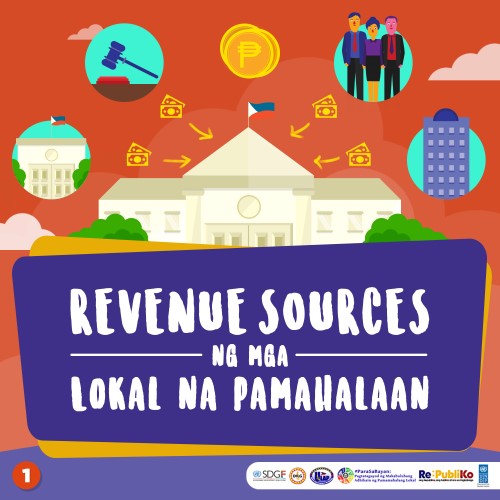
Saan nga ba nanggagaling ang pondo ng mga lokal na pamahalaan? Anu-ano ang mga pinagkukunan ng yaman ng ating mga LGU na siyang inilalaan para sa iba’t ibang serbisyo nito sa lokalidad? Bilang mamamayan, mahalagang malaman natin ito upang maging pamilyar sa usaping pinansyal at maging mapanuri sa pondo at kakayanan ng ating LGU.
Alamin natin sa infographics na ito, handog ng partnership ng DILG, Union of Local Authorities of the Philippines (ULAP), at United Nations RePubliKo campaign.
RESPONSIBILIDAD NG MGA LOCAL GOVERNMENTS SA PEACE AND ORDER

ULAP conducted an RTD entitled “Delivering Basic Services in Urbanizing Areas: Challenges, Prospects, and Areas for Reform”
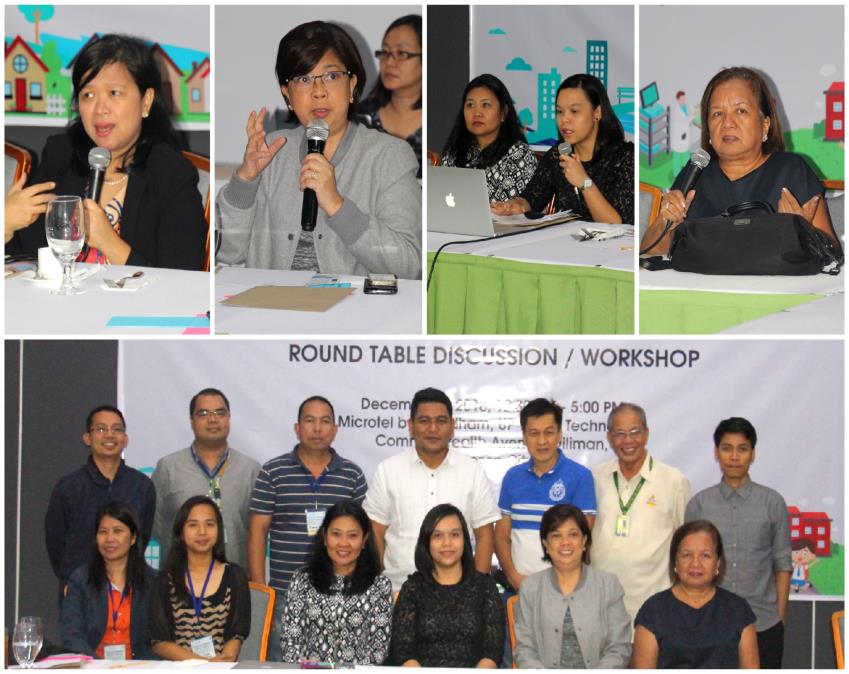
The Union of Local Authorities of the Philippines (ULAP), the umbrella organization of all leagues of local government units (LGUs) and locally elected officials in the country, supported by the Department of the Interior and Local Government (DILG) and the United Nations Philippines RePubliKo campaign, conducted a Round Table Discussion (RTD) entitled “Delivering Basic Services in Urbanizing Areas: Challenges, Prospects, and Areas for Reform” December 8, 2016 at Microtel by Wyndham, UP Technohub, Quezon City and was attended by a total of twenty-three participants from national government agencies, local government units, development partners, and member leagues.
The RTD aimed to respond and initiate an in-depth discussion among key stakeholders to outline challenges, prospects, and areas of reform that can inform national and local strategies on urban development. Taking on the issue of urban development as a continuing challenge for local governments, the RTD focuses on the interface of the roles and responsibilities of national and local governments on service delivery amidst urbanization.
The RTD session started with two presentations that provided the context for the discussion, headed by USec. Marion Jimenez-Tan of the National Anti-Poverty Commission and Ms. Ina Tolentino and Anna Abalahin of the League of Cities of the Philippines. These were followed by the workshop wherein the participating LGUs and development organizations exchange feedback on the emerging challenges in the said urbanizing areas.
During the RTD, the participants were able to generate a map of issues and recommendations on service delivery in urbanizing areas. The gathered insights from the participating LGUs and agencies derived an issue and prospect map that was primarily facilitated by the interface of national and local perspectives on service delivery and urbanization. Likewise, the discussions during the RTD surfaced issues primarily on the inevitable impact of growing population and expansion of needs and demands of citizens. The most common of which is the growing concern on mass dwelling and land use.
Through this RTD, an initial issue map has been generated that can serve as a starting point of wider discussions and data gathering on urban development. Finally, this RTD intends to contribute to the on-going and prospective national-local dialogues that can further strengthen the advocacy of efficient and effective service delivery in urban areas.
See Documentation: http://ulap.net.ph/resources/knowledge-products-and-reports/303-delivering-basic-services-in-urbanizing-areas-challenges-prospects-and-areas-for-reform.html
ULAP conducted an RTD entitled “Do local governments have too much money: Unpacking the Puzzle of Local Government Budget Surplus”
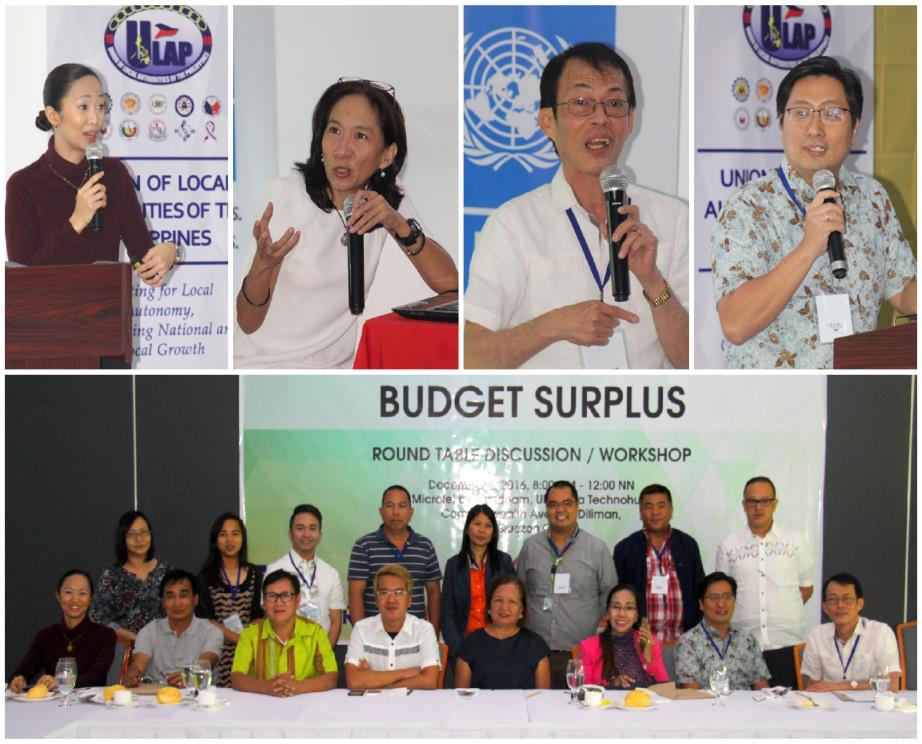
The Union of Local Authorities of the Philippines (ULAP), the umbrella organization of all leagues of local government units (LGUs) and locally elected officials in the country, supported by the Department of the Interior and Local Government (DILG) and the United Nations Philippines RePubliKo campaign, conducted a Round Table Discussion (RTD) entitled “Do local governments have too much money: Unpacking the Puzzle of Local Government Budget Surplus”. This was held on December 8, 2016 at Microtel by Wyndham, UP Technohub, Quezon City and was attended by a total of forty (40) participants from national government agencies, local government units, development partners, and member leagues.
The RTD sought to gather insights from key stakeholders to raise issues and responses on what seems to be “underspending” of local governments. It also facilitated discussions on the Special Education Fund and Bottom-Up Budgeting (BuB) to cater the concerns on local project implementation and budget execution. It is with this backdrop the RTD facilitated its discussion and program flow. Approaching the questions on the interface of national and local governments, resource speakers were invited to present different perspectives on local government’s fiscal spaces. Some of the issues identified during the RTD by the participants were the following: 1. Non-alignment of priorities between national and local governments, 2. Unclear assignment of functions (national vis- à-vis local) on fiscal transfers and support and 3. LGUs’ autonomy on fund utilization.
This RTD has surfaced issues and concerns on how the local government budget surplus is viewed by key stakeholders. The outputs derived herein sharpened the questions and provide clearer context on the matter, taking a significant step to further discourses and studies. Ultimately, The output of this RTD is a white paper that can be used by local governance and public financial management advocates to pursue reforms to address the challenge at hand.
See Documentation: http://ulap.net.ph/resources/knowledge-products-and-reports/304-unpacking-the-puzzle-of-local-government-budget-surplus-do-local-governments-have-too-much-money.html
ULAP conducted an RTD on Harmonizing Agricultural Sector with the Local Government Agenda and its Roadmap to Federalism
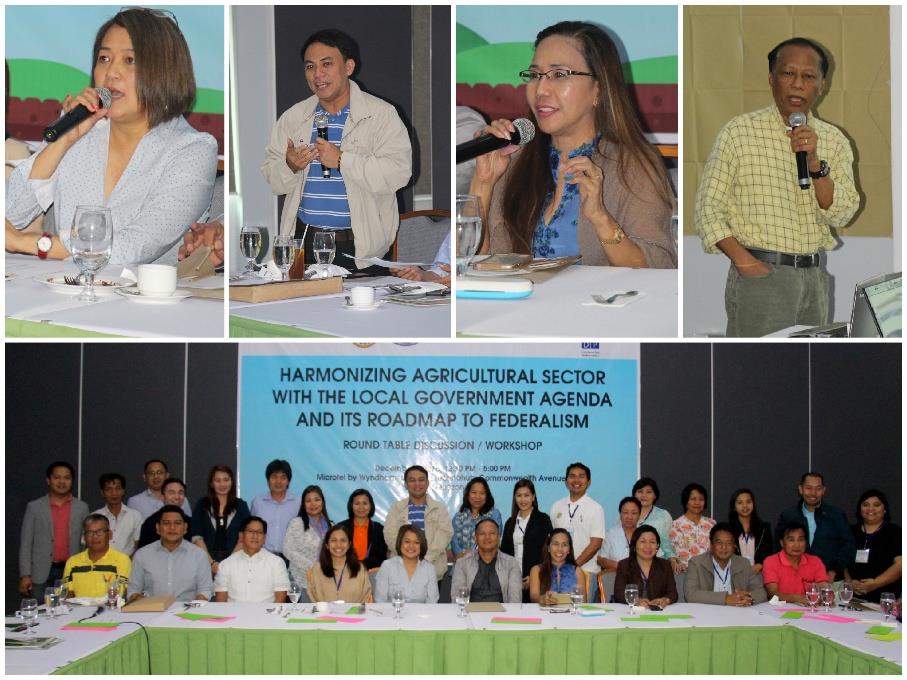
The Union of Local Authorities of the Philippines (ULAP), the Department of Interior and Local Government (DILG), and the United Nations Philippines RePubliKo campaign conducted a Roundtable Discussion (RTD) to respond and initiate an in-depth discussion about critical issues and concerns of LGUs that need to be addressed in further conversations on the agricultural sector in order to align the agricultural sector with the local government agenda of the Local Government Units (LGUs). With the theme, “Harmonizing Agricultural Sector with the Local Government Agenda and its Roadmap to Federalism,” the said RTD was held on December 7, 2016 at Microtel By Wyndham, UP TechnoHub, Commonwealth Avenue, Quezon City.
Attended by a total number of fifty-one (51) attendees from the Local Government Units (LGUs), national government agencies (NGAs) and other development partners, aimed to provide an opportunity to formulate legislative measures and policy proposals based on emergent findings and reports from the RTD. One of the speakers of the RTD is Director Leo Cañeda, from the Office of the Undersecretary for Operations of the Department of Agriculture (DA), presented the thrusts and principles which will serve as a guide in implementing programs and projects during the current administration for six years and discussed policy directions on harmonizing agricultural sector with local government agenda and its roadmap to federalism. While Dir. Alicia Ilaga, Director for DA Systems-Wide Climate Change Office (SWCCO), was invited to discuss and explain the current national initiative on climate change in agriculture through ‘Strengthening Adaptation and Mitigation Initiative in Agriculture (AMIA)’. AMIA defines DA’s national framework in addressing climate change in agriculture and serves as the umbrella program covering climate change across all programs, functions, and agencies at DA.
During the RTD, an open discussion on various aspects on agricultural services issues was conducted and the delegates were asked to identify different recommendations based on their experiences and provide further solutions to the issues which see them appropriate for them. Some of the issues identified that hinders the performance of LGUs in addressing concerns in agricultural productivity is the lack of technical capacity of agricultural workers and/or officials, whose major task is to provide assistance and guidance in increasing farm productivity, which may be considered factor to the stagnant condition of agriculture. In response to this, the delegates were asked to frame policy recommendations and immediate response thereto which deemed appropriate to their agricultural needs.
Overall, the output of the RTD is to produce an roadmap – in the form of a white paper – that will be given to the Office of the President/Office of the Cabinet Secretary, Senate and Congress, and key national government agencies. This white paper will serve as the first of a series of LGU positions and inputs addressing the issues and concerns on devolution of the LGUs in the face of the federalism state of government.
See Documentation: http://ulap.net.ph/resources/knowledge-products-and-reports/302-harmonizing-agricultural-sector-with-the-local-government-agenda-and-its-roadmap-to-federalism.html
ULAP conducted an RTD on Addressing Health Devolution Gaps and Mainstreaming the Philippines Health Agenda to Local Governments
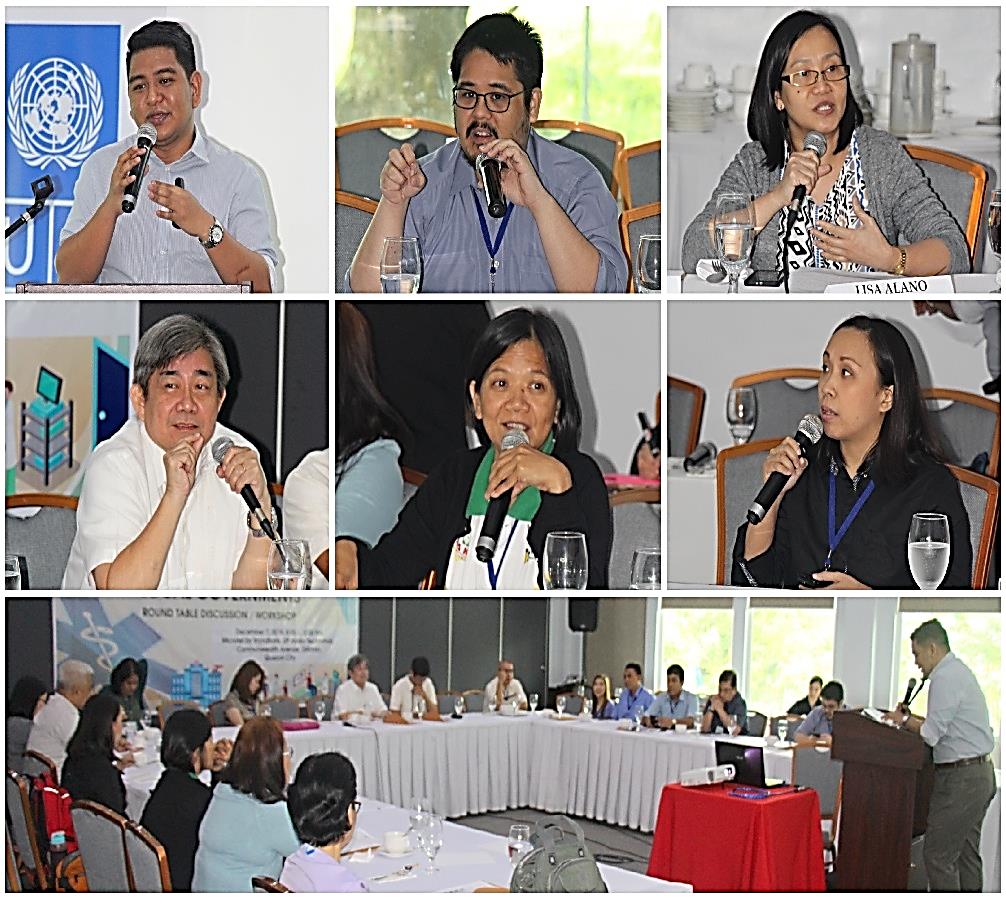
The Union of Local Authorities of the Philippines (ULAP), the Department of the Interior and Local Government (DILG), and the United Nations Philippines RePubLiKo campaign initiated a series of Roundtable Discussion (RTD) as part of the #ParaSaBayan partnership forged early this year. The series is composed of five (5) RTDs) designed to cover various topics based on the RePubLiKo and #ParaSaBayan initiatives to align with the scope and priorities of the agreement among the three institutions. One of the slated topics is focused on the functions of the government on delivering health services with the theme “Addressing Health Devolution Gaps and Mainstreaming the Philippines Health Agenda to Local Governments” on December 7, 2016 at Microtel by Wyndham, UP Technohub, Quezon City.
The said RTD was attended by a total of 50 participants from different local governmnet units (LGUs) and NGAs and other development partners. The RTD aims to determine local concerns and issues on devolution, and to formulate legislative measures and policy proposals based on its findings and keep track of government’s progress in implementing policy reforms. The guest speakers of the RTD like Ms. Gloria Nenita Velasco, Management Officer IV from the Department of Health, presented the status quo of the government in terms of health services and exhibited the Philippine Health Agenda for the term 2016-2022. While, Ms. Elena Kim Erro, from the office of Phillipine Health Insurance Corporation (PhilHealth), discussed the roles of LGUs based on the Republic Act No. 10606 otherwise known as the “National Health Insurance Act of 2013. The said law provides that all citizens of the Philippines, regardless of social and economic status, shall be covered by National Health Insurance Program (NHIP).
Subsequently, an open discussion focusing on the issues and concerns on the implementation of PhilHealth and HFEP in their locality followed and the delegates were asked to identify different recommendations based on their experiences and provide further solutions to the issues which see them appropriate for them. The discussions revealed the process barriers, and system shortcomings that are significant impediments to quality and that preclude the delivery of an efficient services on both programs of the DOH at the local level.
The RTD is projected not to be able to provide all answers to the concerns and issues of the LGUs, but this was held to be an avenue to create convergence and strengthen partnership among stakeholders. Lastly, the output of this RTD is to produce an issue map – in the form of a white paper – that will be given to the Department of Health, Senate and Congress, and other key national government agencies. The white paper will serve as the LGU positions and inputs to the continuing health discourse.
See Documentation: http://ulap.net.ph/resources/knowledge-products-and-reports/301-addressing-health-devolution-gaps-and-mainstreaming-the-philippine-health-agenda-to-local-governments.html

